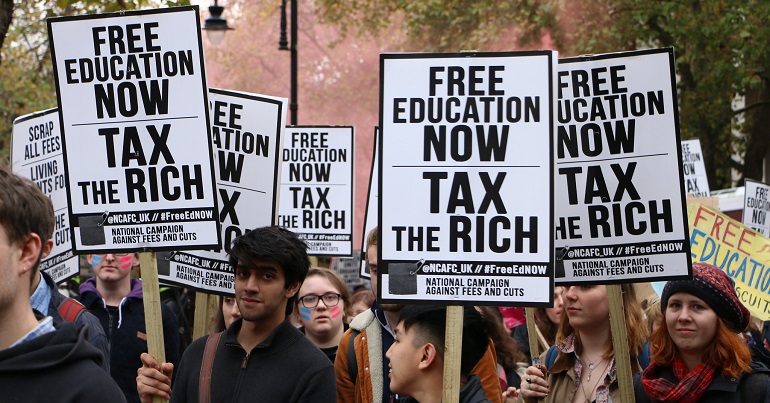Students win in Scotland through Power of Protest
Jim Hacker, the fictional Prime Minister in “Yes Prime Minister” at one point says grandiosely of the electorate “It’s the people’s will. I am their leader; I must follow them.” There is an important lesson for all campaigners in how students have managed to make fees an issue on which politicians will follow them.
Last week the Scottish media were enthusiastically reporting a poll suggesting that 65% of the population were in favour of students making a contribution to the cost of their degree. Yet only one of the Scottish parties is proposing that students make such a contribution. The SNP, Labour and Greens have all made clear pre-election promises not to charge student fees. Even the Liberal Democrats have tried to close the door after their £9000-a-year fees horse bolted by claiming to be against fees in Scotland.
And it’s not just Scotland. All the parties in Northern Ireland have ruled out £9000 a year fees. Even the doctrinaire Amero-philes in the DUP have ruled fees out.
What this shows is this the power of protest. Where normally government is guided by focus groups, polls and the well-paid lobbyists in sharp suits who whisper sweet tales of privatisation in the ears of politicians, for the rest of us protest provides a very successful antidote.
I was a student from 1998-2004. During that time fees were introduced for the first time, and the foundations laid for the £3000 a year fees introduced by the last Labour government. In response to this student leaders organised a few marches. In 1999 we marched in orderly fashion down Princes Street. This secured deferred fees for Scottish students. Instead of being charged £1000 a year, Scottish students were charged just over £2000 on graduation. Protest worked – we secured a concession in proportion to our protest.
The student protests in October and November were a whole different matter. Instead of a gentle walk through London students expressed their anger fulsomely. We all remember the images from Millbank. And that explosion of anger has so frightened our politicians in Scotland that they take their lead not from lobbyists for Universities, nor from business leaders, and not even from focus groups and polls. Instead almost all Scottish politicians have been cowed by the student protests.
It is interesting the extent to which protest produces results in almost direct correlation to the anger of the protest. This shows how we can counter the narrative that the cuts are right, but just too far and too fast. The lesson is that we must harness public anger through protest at cuts to welfare and public services to stop the Westminster government and pull our political representatives off the fence on cuts. There is, as Adam Ramsay points out, plenty of money to go round. But that money’s only available for the common good if we’re not intensely relaxed about people getting filthy rich.
We need protest and we need it soon so we can beat the cuts being imposed by this government at the behest of the filthy rich, and ensure that the next government wants to make a more equal society, not make (slower and shallower) cuts to public services. And that protest has to be angry, otherwise we’ll lose the rights and services it took so long for popular movements to win.





Thanks for your comment Michael.
It is certainly more complex than I’ve presented it. But the really interesting thing is that students in Scotland will be paying less in direct tuition fees after this election than they were in the ‘good times’. The arguments about education by ability not ability to pay were relevant at that time too – but the policy outcome this time is no fees.
That is, I think, partly due to the SNP’s election commitments last time. But it’s largely due to the protests in London.
The really interesting thing that I’d noticed was that the parties were taking this stance despite the opinion poll findings.
Thanks again,
Peter
Peter,
interesting, and much of this is right, but a bit too simplistic for my liking. You appear to be suggesting that student protest was the only factor in stopping fees, but there are others, and foremost amongst them a broad general understanding that education should be offered on merit rather than ability to pay. The UK’s ‘blue heartlands’ are almost all in England, and that is where Thatcherism’s ludicrousnesses held sway that Blair built on – Scotland, Wales and NI were never captive to that discourse in the same way.
That we now have people in Scotland arguing for fees is perhaps largely attributable to the growing impact of a Tory press. Where I do agree with you is that any Scottish government that seeks to introduce fees will be met with unprecedented protests and will self-destruct/discredit themselves for a generation – just as the UK LibDems have done (can you imagine anyone trusting the LDs again in the near future?). An LD fate is far more of a useful warning than anything else!
Thanks,
Michael